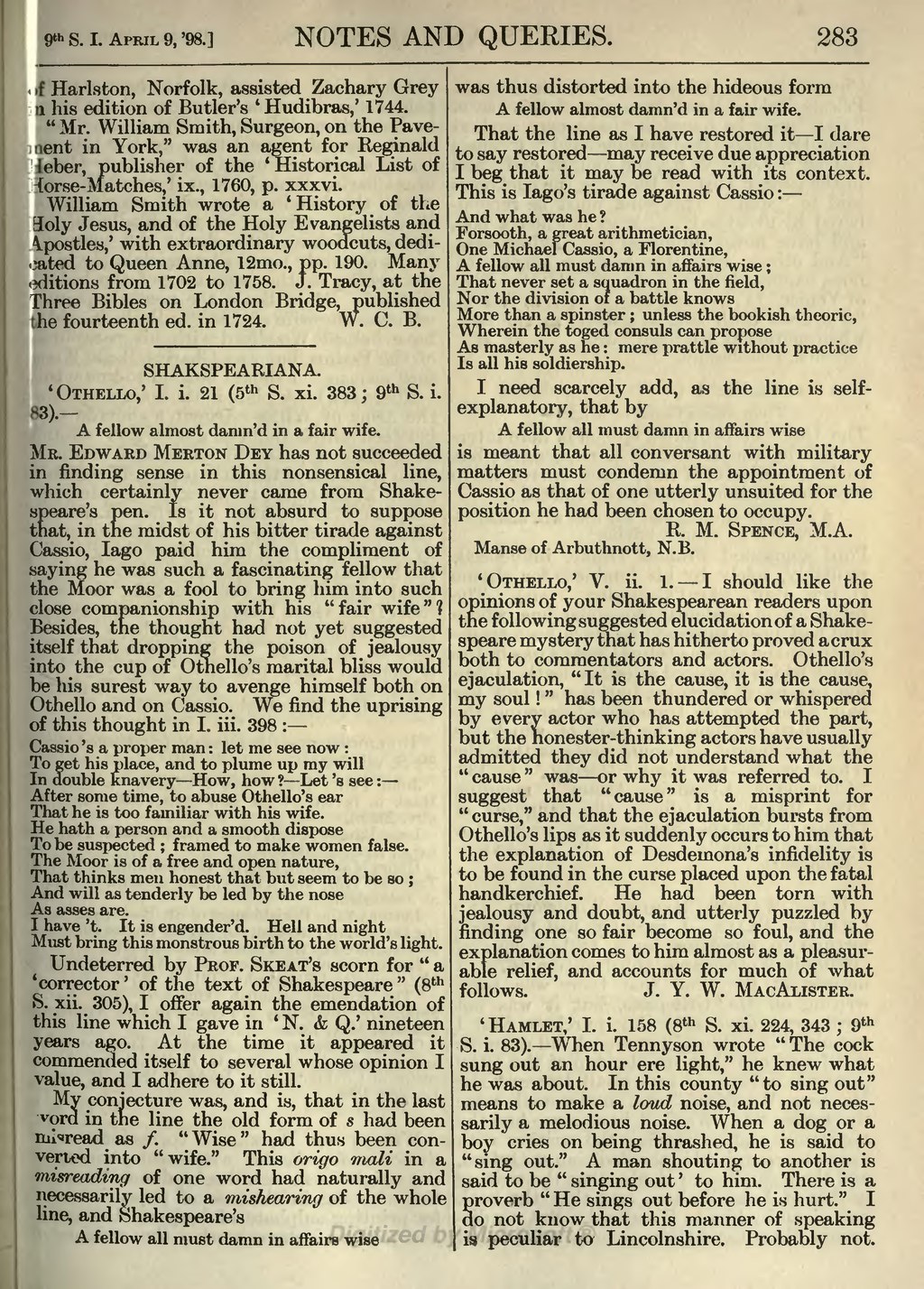S. I. APRIL 9, '98.]
NOTES AND QUERIES.
283
>f Harlston, Norfolk, assisted Zachary Grey
n his edition of Butler's * Hudibras,' 1744.
"Mr. William Smith, Surgeon, on the Pave-
jnt in York," was an agent for Reginald
- ber, publisher of the 'Historical List of
)rse-Matches,' ix., 1760, p. xxxvi. William Smith wrote a * History of the )ly Jesus, and of the Holy Evangelists and sties,' with extraordinary woodcuts, dedi- to Queen Anne, 12mo., pp. 190. Many <3ditions from 1702 to 1758. J. Tracy, at the Three Bibles on London Bridge, published the fourteenth ed. in 1724. W. C. B.
SHAKSPEARIANA.
'OTHELLO,' I. i. 21 (5 th S. xi. 383; 9 th S. i. 83).
A fellow almost danm'd in a fair wife. MR. EDWARD MERTON DEY has not succeeded in finding sense in this nonsensical line, which certainly never came from Shake- speare's pen. Is it not absurd to suppose that, in the midst of his bitter tirade against Cassio, lago paid him the compliment of saying he was such a fascinating fellow that the Moor was a fool to bring him into such close companionship with his "fair wife"? Besides, the thought had not yet suggested itself that dropping the poison of jealousy into the cup of Othello's marital bliss would be his surest way to avenge himself both on Othello and on Cassio. We find the uprising of this thought in I. iii. 398 : Cassio 's a proper man : let me see now : To get his place, and to plume up my will In double knavery How, how ? Let 's see : After some time, to abuse Othello's ear That he is too familiar with his wife. He hath a person and a smooth dispose To be suspected ; framed to make women false. The Moor is of a free and open nature, That thinks men honest that but seem to be so ; And will as tenderly be led by the nose As asses are.
I have 't. It is engender'd. Hell and night Must bring this monstrous birth to the world's light. Undeterred by PROF. SKEAT'S scorn for " a 'corrector' of the text of Shakespeare" (8 th S. xii. 305), I offer again the emendation of this line which I gave in ' N". & Q.' nineteen years ago. At the time it appeared it commended itself to several whose opinion I value, and I adhere to it still.
My conjecture was, and is, that in the last vord in the line the old form of s had been misread as /. "Wise" had thus been con- verted into "wife." This origo mali in a misreading of one word had naturally and necessarily led to a mishearing of the whole line, and Shakespeare's
A fellow all must damn in affairs wise
was thus distorted into the hideous form
A fellow almost damn'd in a fair wife. That the line as I have restored it I dare to say restored may receive due appreciation I beg that it may be read with its context. This is lago's tirade against Cassio :
And what was he ?
Forsooth, a great arithmetician,
One Michael Cassio, a Florentine,
A fellow all must damn in affairs wise ;
That never set a squadron in the field,
Nor the division of a battle knows
More than a spinster ; unless the bookish theoric,
Wherein the toged consuls can propose
As masterly as he : mere prattle without practice
Is all his soldiership.
I need scarcely add, as the line is self- explanatory, that by
A fellow all must damn in affairs wise is meant that all conversant with military matters must condemn the appointment of Cassio as that of one utterly unsuited for the position he had been chosen to occupy.
R M. SPENCE, M.A. Manse of Arbuthnott, N.B.
'OTHELLO,' V. ii. 1. I should like the opinions of your Shakespearean readers upon the following suggested elucidation of a Shake- speare mystery that has hitherto proved a crux both to commentators and actors. Othello's ejaculation, "It is the cause, it is the cause, my soul ! " has been thundered or whispered by every actor who has attempted the part, but the nonester-thinking actors have usually admitted they did not understand what the " cause " was or why it was referred to. I suggest that "cause" is a misprint for " curse," and that the ejaculation bursts from Othello's lips as it suddenly occurs to him that the explanation of Desdemona's infidelity is to be found in the curse placed upon the fatal handkerchief. He had been torn with jealousy and doubt, and utterly puzzled by finding one so fair become so foul, and the explanation comes to him almost as a pleasur- able relief, and accounts for much of what follows. J. Y. W. MACALISTER.
'HAMLET,' I. i. 158 (8 th S. xi. 224, 343 ; 9 th S. i. 83). When Tennyson wrote " The cock sung out an hour ere light," he knew what he was about. In this county "to sing out" means to make a loud noise, and not neces- sarily a melodious noise. When a dog or a boy cries on being thrashed, he is said to "sing out." A man shouting to another is said to be " singing out ' to him. There is a proverb " He sings out before he is hurt." I do not know that this manner of speaking is peculiar to Lincolnshire. Probably not.
